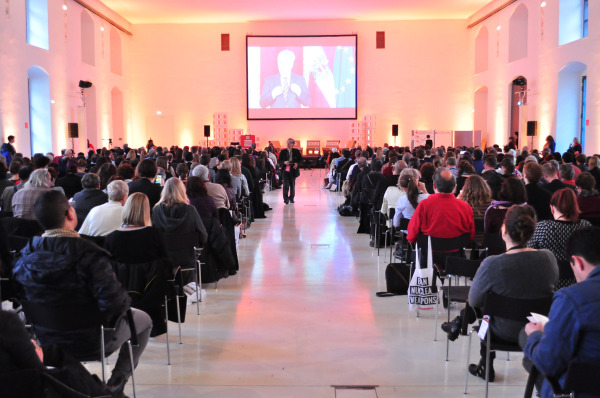The opening session of the civil society forum organised by ICAN (the International Campaign against Nuclear Weapons) with the slogan “The Courage to Ban Nuclear Weapons” heard from experts in various fields about the need to eliminate nuclear weapons from the face of the earth.
Werner Kerschbaum from the Austrian Red Cross outlined what would happen to the emergency services in Vienna in the event of a nuclear explosion there. In very sombre tones he explained how a bomb would destroy the medical facilities and supplies and would kill a significant percentage of medical personnel. Being such an important hub for all services in the alpine country, a bomb on the capital would destroy services for a vast region.
Responding to the fact that emergency services would be unable to respond to such a situation, Kerschbaum said, “Nuclear Weapons – How could we not care?”
Paul Walker, from Green Cross International, the brain child of Gorbachev at the end of the cold war, described the impacts of various weapons of mass-destruction and the difficulties of getting rid of them. Describing how chemical weapons have been dumped on land and at sea including recent incidents of fisherman dying from mustard gas after pulling up dumped missiles in their nets, Walker then went on to talk about the effects of increased rates of cancer, deformity and infant mortality as a result of nuclear testing.
Finally, it was explained how there is enough fissile material for 100,000 weapons in 32 countries.
Dr. Ira Helfand from International Physicians for the Prevention of Nuclear War presented the scenario of a ‘limited’ nuclear war between two countries with the use of 100 weapons or 0.03% of the world’s nuclear arsenal.
In the model there would be a global drop of temperatures of 1.3 C within 3 days. To put this in context, global warming is estimated to have been around +0.6 C over several decades. The resulting change would cause a significant drop in crop production: 17% rice, 10% maize, 39% wheat. A total rice crop failure would occur in Asia. This would result in the estimated deaths of 1 to 2 billion people through starvation.
Frankly, he terrified the audience, including this reporter.
Describing in more detail what would happen were a bomb to be dropped on New York. He outlined:
- Within a 3km radius a fireball would reach a temperature of 11 million centigrade within a fraction of a second
- 1000km/h winds would affect a radius of 6km
- Within 9km cars would melt
- Within 15km winds of 300km/h would destroy masonry, leaving behind only steel frames for buildings
- Within 25km the heat would be so intense that everything flammable would be burnt. A giant fireball would develop, engulfing anything still remaining.
It’s not clear that the planet would be inhabitable in the Northern Hemisphere or that anyone would want to live there.
Later on I asked Dr. Helfand what would happen to the nuclear plants in the facility and he explained that this would only make matters worse because the plants would be sure to be disrupted. Without personnel or electricity to keep the nuclear fuel cooled then they would surely suffer from core meltdowns and explosions, pumping far more radiation into the air than would be produced by the bomb itself.
The last speaker in the panel, Greg Mello from the Los Alamos Study Group from New Mexico in the USA, the home of a large part of the nuclear weapons industry, denounced the tiny steps at disarmament that have been taken since the end of the cold war. “It is not disarmament when you haven’t changed your basic strategy.”
Winding up the panel, Susi Snyder, the moderator from PAX in the Netherlands tried to lift the mood telling everyone that we can achieve a ban and the abolition of nuclear weapons, that we should not be discouraged by what we’ve heard, but instead take heart from the fact that so many of us are here, talking about it, and pushing incessantly to make these weapons a thing of the past.
Without Susi’s infectious positivity it would be difficult to continue into the afternoon sessions which will be sure to cause more anxiety in the forum participants.
The organisers assure us that tomorrow things become more hopeful!










